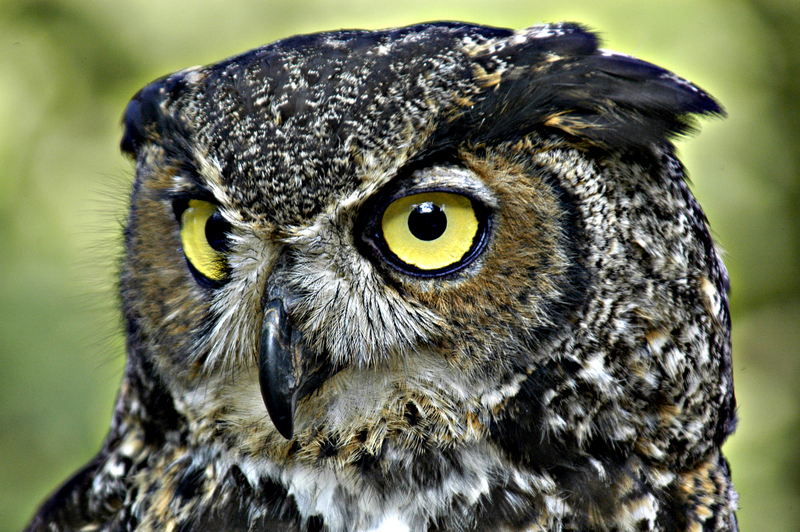|
| 질의: northern hawk owl | 결과: 26번째/49 | |
Great Horned Owl (Bubo virginianus) - Wiki
| 제목: | Great Horned Owl (Bubo virginianus) - Wiki
| |

| 해상도: 1800x1197
파일크기: 2378938 Bytes
촬영일: 2006:08:19 08:53:41
사진기: NIKON D100 (NIKON CORPORATION)
F number: f/6.3
Exposure: 10/1600 sec
Focal Length: 3000/10
등록시간: 2006:12:07 01:28:13
|
Great Horned Owl
From Wikipedia, the free encyclopedia
[Photo] Taken by Peter Manidis, (AKA Falxuis). 3-4 Year old Great horned owl, taken in Balsam Mountains, North Carolina. Bird is currently in rehabilitation after sustaining a wing injury from colliding with a car.
The Great Horned Owl, Bubo virginianus, is a very large owl. It reaches a length of 1'8"-2' (50-60 cm), a wingspan of 4'6"-4'10" (135-145 cm), and weighs 1000-2500 grams, with females being larger than males.
Adults have large ear tufts, a reddish face, a white patch on the throat and yellow eyes. The ear tufts are not actually ears, but just tufts of feathers. The underparts are light with brown barring; the upper parts are mottled brown. The legs and feet are covered in feathers up to the talons. There are individual and regional variations in colour; birds farther north are paler.
Their breeding habitat is almost anywhere across North America and parts of South America. They are often found in urban and suburban settings and are a common backyard bird. They often take over a nest used by some other large bird, sometimes adding feathers to line the nest but usually not much more. In the Sonoran desert, they often take over abandoned Red-tailed Hawk nests in the arms of Saguaro cacti.
Great Horned Owls are one of the earliest breeding owls of North America. They breed in late January or early February and are often heard calling to each other in the fall. They choose a mate by December and are often heard duetting before this time. They are permanent residents, but may wander after the nesting season. Especially non-breeding birds without an own territory ("floaters") are quite vagrant.
These birds hunt at night by waiting on a high perch and swooping down on prey. They mainly eat mammals such as rats, mice, rabbits and skunks, as well as small birds, including smaller owls. In northern regions, they may let uneaten food freeze and then thaw it out later using their own body heat.
They have excellent hearing and exceptional vision in low light. Compared to humans, owls have a much sharper depth of perception to their hearing. This is possible because owl ears are not placed in the same position on either side of their head: the right ear is typically set higher in the skull and at a slightly different angle. By tilting or turning its head until the sound is the same in each ear, an owl can pinpoint both the direction and the distance to the source of a sound.
Owl eyes are also nearly as large as those of a human. They are in, fact, so large that they are immobile within their sockets. This is one reason that owls need flexible necks. They have the same number of vertabrae in their necks as most mammals and can move their heads 270 degrees (not all the way around!).
Their call is a low-pitched but loud "ho-ho-hoo hoo hoo." Sometimes it is only four syllables instead of five. The female's call is higher and rises in pitch at the end of the call. Young owls make hissing or screeching sounds that are often confused with the calls of Barn Owls.
The Great Horned Owl is the provincial bird of Alberta. Great horned owls can be easily confused with Bubo magellanicus, the Magellanic Horned Owl (which was for some time believed to belong into this species), and other eagle-owls.
http://en.wikipedia.org/wiki/Great_Horned_Owl
| The text in this page is based on the copyrighted Wikipedia article shown in above URL. It is used under the GNU Free Documentation License. You may redistribute it, verbatim or modified, providing that you comply with the terms of the GFDL. |
|
댓글 |
|---|
| | 손님 |
|
| Great Horned Owl (Bubo virginianus) |
| | 손님 |
|
| do you now how are they exticting |
| | 손님 |
|
| how are they exticting |
^o^
동물그림창고 똑똑전화 누리집
^o^
|
|
|

